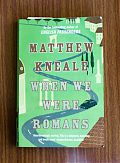
Matthew Kneale
When We Were Romans
I read this novel in a couple days at the beginning of summer. It’s one of those books that grabs hold, pulls in, and doesn’t let go until the end. Its two strengths—the story, or the building of suspense, and the narrator’s voice—work together so that it’s unclear at times how the novel is being propelled forward so sublimely, the voice and the story working in near-perfect tandem.
To start with, the story. We are thrown into it in much the same way as we are thrown into Jenn Ashworth’s A Kind of Intimacy. We begin with an uneasiness that is given a ride, disappearing then reappearing throughout the book. It’s a case where the least said is best, on the chance that you, dear reader, might want to give this book a read.
I can’t help reflecting, especially after a month has passed since I read it, at how Kneale keeps this uneasiness directly under the surface, so there are moments when we forget about it and moments when we see its shape, but only outlined against the surface sheet. The uneasiness also does much to propel the story forward, working in an unconscious way in the reader who wishes to relieve it, to understand why we are feeling it, as soon as possible.
And secondly, the voice. Much has been written about the voice in blog reviews when this book came out, and rightly so. Matthew Kneale, somehow, has gotten into the head of a nine-year-old boy and transcribed the thoughts that passed therein. Lawrence narrates When We Were Romans with much of the genuineness that we would expect from someone his age: lots of sentence fragments, misspellings, run-ons, mispunctuations, and flights of fancy directed toward Roman Emperors and the Cosmos.
And also like a nine year old, Lawrence’s emotional trajectory is wobbly: at one moment he’s angry with his sister, in the next he’s being very caring to her; he’s upset that his mom decides suddenly that the three of them should drive to Rome from England, he’s excited to be making the trip. The voice is one of the main elements to the aforementioned suspense, and it’s endearing execution makes Lawrence so believable that we are with him until the end—though it might be heartbreaking.
If you read this site, you know I’m interested in reading books set in Rome, and this is one of those rare contemporary gems that creates a delicious portrait of the city without any romanticism. Matthew Kneale lives in Rome and writes Rome from one who has lived here for a while, with an eye for the irony of the city’s beauty, of how it’s packaged with an equal amount of its opposite.
Writing Rome through the eyes of a child has freed the text from any all too common sentiment and has allowed Kneale to divulge a unique rendering. Lawrence’s observations of Rome were enjoyable for their freshness, such as the comparison of the Tiber to a trench, the stories he tells of crazed popes and emperors, and the transliteration of Italian.
Even though it’s been nearly two months and a couple novels since I read When We Were Romans, much about it is still fresh; a good sign for any book if it can vividly survive in my book-entrenched mind.
· · · · · · · · · · · · · · · · · · · ·